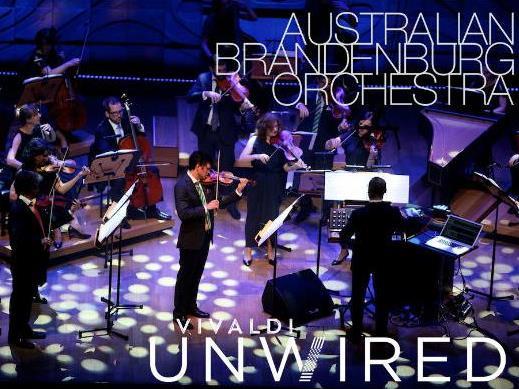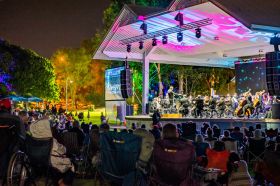Image: Supplied
Instigated by artisitc director Paul Dyer in 1989, the Australian Brandenburg Orchestra is a bright and fresh force in the world of Australia’s classical music. Dyer’s imaginative programming, and the sheer personality that shines out from the ensemble, has resulted in a keen following of subscribers to this dynamic and award winning orchestra. This concert was the second series of six for this year and toured Sydney, Melbourne and Brisbane.
Dyer reveals new directions in his latest concert “Vivaldi Unwired” for the ABO, which previously boasted of its utilisation of traditional period instruments. Following passionate and uplifting performances of Brandenburg concerto No.3 in G Major by Bach and Vivaldi’s Concerto Op. 3 No. 8 for two violins, suddenly in the third piece of the first half the audience is surprised to find the flute replaced by a much more contemporary fellow, the soprano saxophone, in a concerto by Carl Emmanuel Bach. Performer and adapter of the piece, Christina Leonard, displays intense musical commitment and virtuosity on saxophone. The hazy street corner melancholy of the sax works with and against the orchestral baroque backdrop in which it is placed. It is an unusual juxtaposition, the smokey sensual throaty tone of the saxophone jars with the expectation of the dry precise sound that is the hitherto hallmark of the baroque period.
However, it is the second half of the concert which fulfills the promise of a Baroque concert with a twist of contemporary dare. Somewhat inappropriately titled “Vivaldi Unwired”, it comes to pass that the wires are very much plugged in, the switches are on and electrical amplification is afoot. Looking like a crazed sorcerer from the back, Paul Dyer stands in traditional conductor pose, but gone is the music stand and the baton as he now faces a panel of knobs and buttons, and glows in the reflected blue light of his open apple lap top.
The music is popular contemporary orchestral UK composer Max Richter’s recomposition of Vivaldi’s Four Seasons. Richter has created twelve movements of Vivaldi’s four concertos, but here they are instead accompanied by an electric harp and pop-like chord progressions, which pump a thumping rhythm under the familiar friend that is Vivaldi’s Four Seasons. With grace and exceptional theatrical appeal Melina van Leeuwen, the harpist, sits upon a podium and the deep electrical hum of the harp’s voice runs through the auditorium with a commanding undertone.
Richter (b.1966) is a composer who shares with Michael Nyman and Phillip Glass a minimalism and neo-classicism in his music that makes much of his work sound like an excellent film soundtrack. His reworking of Vivaldi uses the latter’s modular and repetitive strategies, but then simplifies it further to drive the listener into a frenzy which builds and builds, and then falls, to nowhere, in my opinion. In parts robotic and edgy and in other parts sickly and saccharin, Richter’s piece is a whirlwind of emotion and vicissitude, veering between sounding like heartfelt homage to this iconic piece of music and an ironic display of technical tinkering. Richter swaggers through the refrains with what sometimes felt to me akin to the mocking disrespect of the hipster in which nothing any longer is sacred and everything is up for grabs, or at least for looping.
The ABO accompanies their playing with a tour de force of theatrical lighting; in “Autumn”, huge red and golden silhouettes of leaves are projected behind the orhcestra, light patterns swirl on the ceiling, “Winter” is icy blue, “Summer” has blooming roses. There is even dry ice at some points; it is an unusually spectacular night for the Elizabeth Murdoch Auditorium.
Perhaps Dyer’s programming is a worthwhile move on the ABO’s part to become more embracing of contemporary composition and dynamic presentation and to wake up an audience that appreciates freshness. The subscriber I sat next to told me she was delighted and transfixed by the performance. Brendan Joyce’s violin playing was exquisite as was Ben Dollman’s; the violin’s were set aflame with their emotional commitment. The ABO has a charismatic set of players and appears to be delighting its audiences with its entree into less traditional interpretation of classical music. Next in the series sees them collaborating with the circus troupe, Circa, to see physical movement incorporated into their performances.
Rating: 4 out of 5 stars
Vivaldi Unwired
Australian Brandenburg Orchestra
Melbourne Recital Centre





